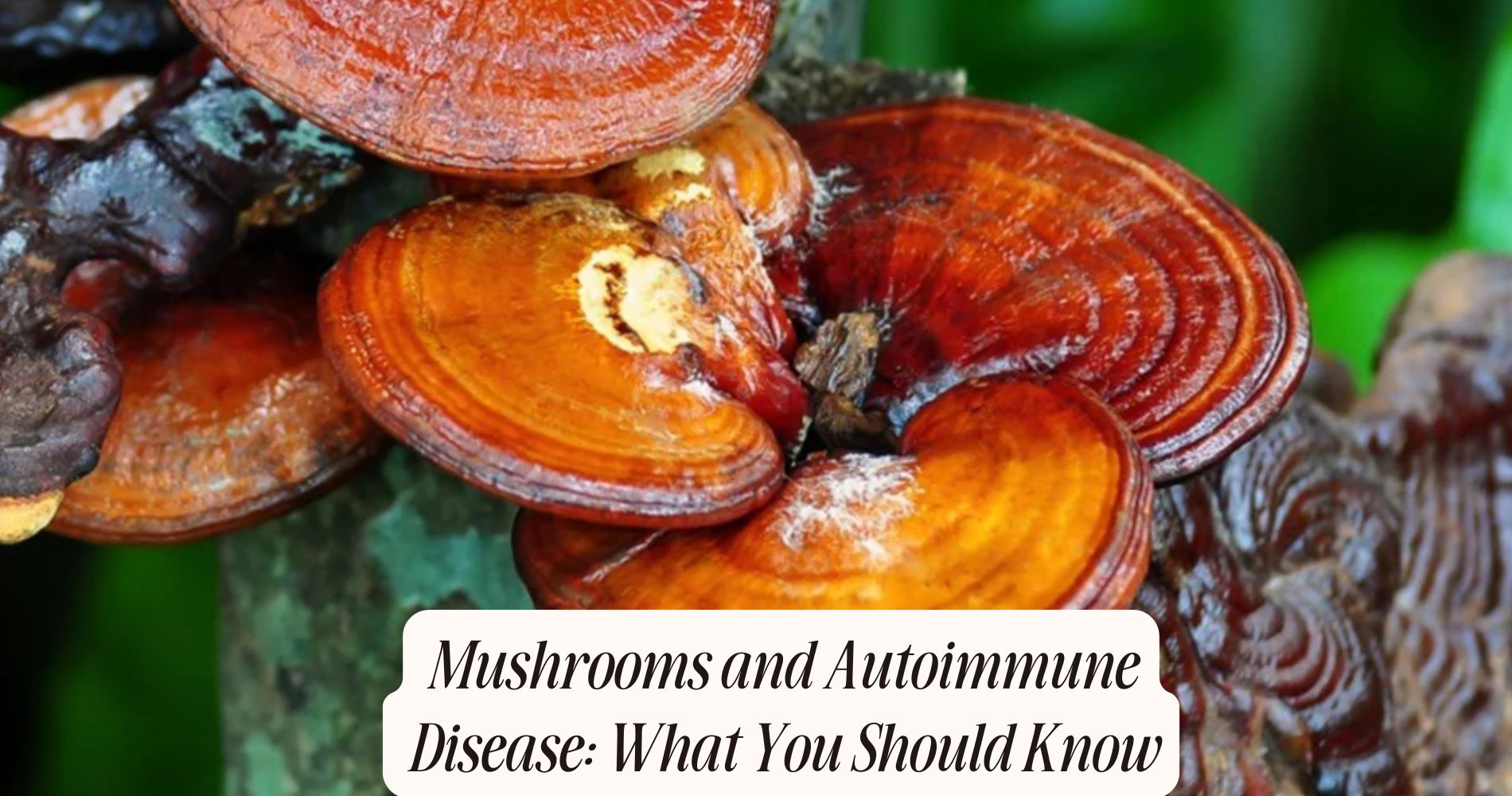
Mushrooms and Autoimmune Disease: What You Should Know
Types of Beneficial Mushrooms
Among the various types of beneficial mushrooms, Reishi, Shiitake, and Chaga stand out for their potential immunomodulatory effects. You'll find these medicinal varieties aren't only valued for their health benefits but also their culinary uses.
Reishi, also known as Ganoderma lucidum, is often called the “mushroom of immortality.” It's renowned for its ability to modulate the immune system, making it particularly useful in managing autoimmune conditions. You can incorporate it into teas or soups to harness its benefits.
Shiitake, or Lentinula edodes, is another medicinal variety celebrated for its health-promoting properties. Rich in polysaccharides, Shiitake mushrooms support immune function while being a staple in many Asian cuisines. Their savory umami flavor makes them an excellent addition to stir-fries, soups, and even as a meat substitute.

Chaga (Inonotus obliquus) grows primarily on birch trees and is lauded for its antioxidant properties. This mushroom is often consumed as a tea or supplement. Chaga's culinary uses may be limited, but its powerful immunomodulatory effects make it a valuable addition to your diet if you're dealing with autoimmune issues.
Understanding these mushrooms can help you make informed dietary choices.
Bioactive Compounds in Mushrooms
Bioactive compounds in mushrooms, such as polysaccharides, triterpenoids, and phenolic compounds, play an indispensable role in modulating immune responses and managing autoimmune diseases.
Polysaccharides, especially beta-glucans, are abundant in mushroom varieties like Reishi and Shiitake. These complex carbohydrates enhance the activity of macrophages and natural killer cells, vital components of your immune system.
Triterpenoids, found in mushrooms like Reishi and Chaga, exhibit anti-inflammatory and antioxidant properties. They inhibit the production of pro-inflammatory cytokines, molecules that can exacerbate autoimmune conditions. By reducing oxidative stress, triterpenoids help maintain cellular integrity and function, contributing to overall health benefits.

Phenolic compounds, present in mushrooms such as Maitake and Lion's Mane, are potent antioxidants. They neutralize free radicals, thereby minimizing cellular damage. These compounds also influence gene expression related to immune responses, offering a multi-faceted approach to immune modulation.
Incorporating a variety of these mushrooms into your diet can offer a synergistic effect. Each mushroom variety brings its unique set of bioactive compounds, collectively enhancing your immune system's ability to regulate itself.
Understanding these bioactive components helps you appreciate the therapeutic potential of mushrooms in managing autoimmune diseases.
Immune-Modulating Properties
The immune-modulating properties of mushrooms are fundamental for balancing immune responses and mitigating the symptoms of autoimmune diseases. Mushrooms contain polysaccharides, particularly beta-glucans, which play a key role in enhancing immune function. These compounds can modulate the immune response by activating macrophages and natural killer cells, essential for pathogen defense while preventing hyperactive immune reactions typical in autoimmune conditions.
Moreover, mushrooms contribute to gut health, a cornerstone of immune system regulation. The gut-associated lymphoid tissue (GALT) is heavily involved in immune response modulation, and mushrooms' prebiotic fibers support beneficial gut microbiota. This symbiotic relationship promotes a balanced immune environment, reducing inflammation and autoimmune flare-ups.
You'll find that the adaptogenic properties of certain mushrooms like Reishi and Cordyceps can help normalize immune functions. They achieve this by modulating cytokine production, thereby ensuring the immune system reacts appropriately to threats without overreacting, which is crucial in autoimmune disease management.

Incorporating mushrooms into your diet or as supplements can therefore offer a dual benefit: directly modulating immune cells and enhancing gut health, both significant for managing autoimmune diseases effectively.
Scientific Studies and Findings
Extensive research underscores the potential of mushrooms in modulating immune responses, particularly through their bioactive compounds like beta-glucans, which have shown efficacy in reducing autoimmune symptoms.
Various clinical trials have investigated the immunomodulatory effects of these compounds. For instance, a study published in the Journal of Autoimmunity found that beta-glucans from medicinal mushrooms greatly decreased pro-inflammatory cytokine levels in patients with rheumatoid arthritis. This reduction in cytokines directly correlated with an improvement in clinical symptoms.
Additionally, the dietary impacts of including mushrooms in your diet have been studied extensively. A randomized controlled trial highlighted in the Journal of Nutrition revealed that participants who consumed a diet rich in mushrooms exhibited enhanced immune function and reduced autoimmune markers compared to the control group. The trial concluded that the regular intake of mushrooms could potentially mitigate autoimmune flare-ups.
Moreover, other studies have focused on specific mushroom species like Reishi and Shiitake, known for their potent immunoregulatory properties. These mushrooms have been shown to influence the balance between regulatory T cells and effector T cells, essential for maintaining immune homeostasis.
Guidelines for Incorporation
Frequently, integrating mushrooms into your diet necessitates an understanding of their specific bioactive compounds and appropriate dosages to effectively manage autoimmune symptoms. Mushrooms like Reishi, Shiitake, and Maitake contain beta-glucans, polysaccharides known to modulate immune responses. To harness these benefits, consider both culinary uses and supplements.
In culinary uses, mushrooms can be easily incorporated into soups, stews, and stir-fries. Cooking techniques like sautéing or simmering enhance the bioavailability of their beneficial compounds. However, achieving therapeutic dosages through diet alone can be challenging. For instance, consuming a few grams of dried Reishi in a daily tea or broth may not suffice for significant symptom relief.

For more precise dosage recommendations, supplements offer a controlled intake of bioactive compounds. Standardized extracts or capsules often provide specific concentrations of beta-glucans and terpenoids. Clinical studies suggest starting with 1-3 grams of Reishi extract daily, divided into two doses, but individual needs can vary.
Always consult with a healthcare provider to tailor the dosage to your specific condition and monitor for any adverse reactions.
Support Your Immune Health with SUPER MUSHROOM GUMMIES
As you explore the relationship between mushrooms and autoimmune disease, consider enhancing your wellness routine with Well Gummies' SUPER MUSHROOM GUMMIES. This convenient gum chew product is packed with 10 functional mushrooms designed to naturally fuel your brain and energize your body. Our vegan gummies provide calmer energy, sharper focus, and immune support, helping you maintain a balanced body and clear mind.
Enjoy the delicious taste of fresh wild berries, as delightful as your favorite candy, but without the jitters or crash. Shine all day with the natural benefits of SUPER MUSHROOM GUMMIES and support your immune health effortlessly.
Frequently Asked Questions
Are There Any Potential Side Effects of Consuming Mushrooms for Autoimmune Disease?
You might experience mushroom toxicity, leading to gastrointestinal reactions like nausea, vomiting, and diarrhea. It's essential to consult a healthcare professional before incorporating mushrooms into your diet, especially if you have an autoimmune condition.
How Do Mushrooms Interact With Common Medications for Autoimmune Conditions?
Mushroom compounds can alter medication metabolism, potentially affecting the efficacy of common autoimmune drugs. You should consult your healthcare provider to understand specific interactions and guarantee your treatment regimen remains safe and effective.
Can Mushrooms Trigger Allergic Reactions in Individuals With Autoimmune Diseases?
Yes, mushrooms can trigger allergic reactions in individuals with autoimmune diseases. Your immune response may misidentify mushroom proteins as harmful, leading to mushroom allergies, which can exacerbate symptoms and complicate your autoimmune condition management.
Are There Specific Mushroom Supplements Recommended for Autoimmune Disease?
Certain mushroom varieties, like Reishi and Shiitake, are recommended for autoimmune diseases due to their immune modulation properties. They can help regulate immune responses, but consult your healthcare provider before starting any supplement regimen.
How Can Dietary Changes Impact the Effectiveness of Mushrooms for Autoimmune Health?
Dietary changes can greatly impact nutrient absorption and immune modulation. Ensuring a balanced diet rich in vitamins and minerals enhances the body's ability to absorb mushroom compounds, potentially increasing their effectiveness in supporting autoimmune health.
Conclusion
Incorporating mushrooms into your diet could support autoimmune disease management. Their bioactive compounds, such as beta-glucans and polysaccharides, have immune-modulating properties that may help regulate your immune system.
Studies indicate potential benefits, but always consult with your healthcare provider before making dietary changes.
By understanding the types of beneficial mushrooms and their specific effects, you can make informed decisions that align with your health goals and potentially improve your quality of life.




